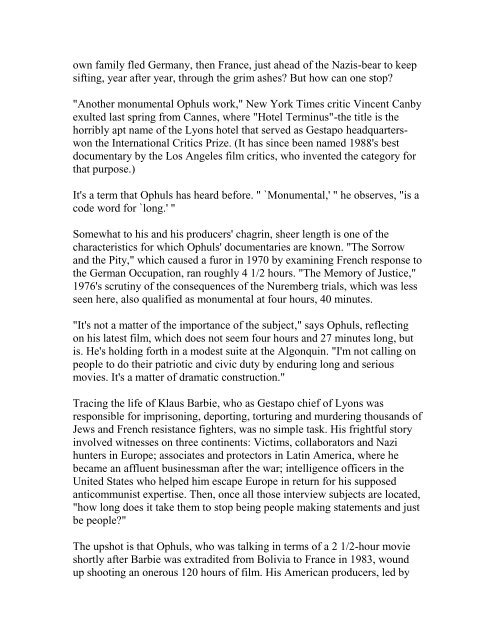HOTEL TERMINUS: The Life and Times of Klaus - Icarus Films
HOTEL TERMINUS: The Life and Times of Klaus - Icarus Films
HOTEL TERMINUS: The Life and Times of Klaus - Icarus Films
Create successful ePaper yourself
Turn your PDF publications into a flip-book with our unique Google optimized e-Paper software.
own family fled Germany, then France, just ahead <strong>of</strong> the Nazis-bear to keep<br />
sifting, year after year, through the grim ashes? But how can one stop?<br />
"Another monumental Ophuls work," New York <strong>Times</strong> critic Vincent Canby<br />
exulted last spring from Cannes, where "Hotel Terminus"-the title is the<br />
horribly apt name <strong>of</strong> the Lyons hotel that served as Gestapo headquarterswon<br />
the International Critics Prize. (It has since been named 1988's best<br />
documentary by the Los Angeles film critics, who invented the category for<br />
that purpose.)<br />
It's a term that Ophuls has heard before. " `Monumental,' " he observes, "is a<br />
code word for `long.' "<br />
Somewhat to his <strong>and</strong> his producers' chagrin, sheer length is one <strong>of</strong> the<br />
characteristics for which Ophuls' documentaries are known. "<strong>The</strong> Sorrow<br />
<strong>and</strong> the Pity," which caused a furor in 1970 by examining French response to<br />
the German Occupation, ran roughly 4 1/2 hours. "<strong>The</strong> Memory <strong>of</strong> Justice,"<br />
1976's scrutiny <strong>of</strong> the consequences <strong>of</strong> the Nuremberg trials, which was less<br />
seen here, also qualified as monumental at four hours, 40 minutes.<br />
"It's not a matter <strong>of</strong> the importance <strong>of</strong> the subject," says Ophuls, reflecting<br />
on his latest film, which does not seem four hours <strong>and</strong> 27 minutes long, but<br />
is. He's holding forth in a modest suite at the Algonquin. "I'm not calling on<br />
people to do their patriotic <strong>and</strong> civic duty by enduring long <strong>and</strong> serious<br />
movies. It's a matter <strong>of</strong> dramatic construction."<br />
Tracing the life <strong>of</strong> <strong>Klaus</strong> Barbie, who as Gestapo chief <strong>of</strong> Lyons was<br />
responsible for imprisoning, deporting, torturing <strong>and</strong> murdering thous<strong>and</strong>s <strong>of</strong><br />
Jews <strong>and</strong> French resistance fighters, was no simple task. His frightful story<br />
involved witnesses on three continents: Victims, collaborators <strong>and</strong> Nazi<br />
hunters in Europe; associates <strong>and</strong> protectors in Latin America, where he<br />
became an affluent businessman after the war; intelligence <strong>of</strong>ficers in the<br />
United States who helped him escape Europe in return for his supposed<br />
anticommunist expertise. <strong>The</strong>n, once all those interview subjects are located,<br />
"how long does it take them to stop being people making statements <strong>and</strong> just<br />
be people?"<br />
<strong>The</strong> upshot is that Ophuls, who was talking in terms <strong>of</strong> a 2 1/2-hour movie<br />
shortly after Barbie was extradited from Bolivia to France in 1983, wound<br />
up shooting an onerous 120 hours <strong>of</strong> film. His American producers, led by



